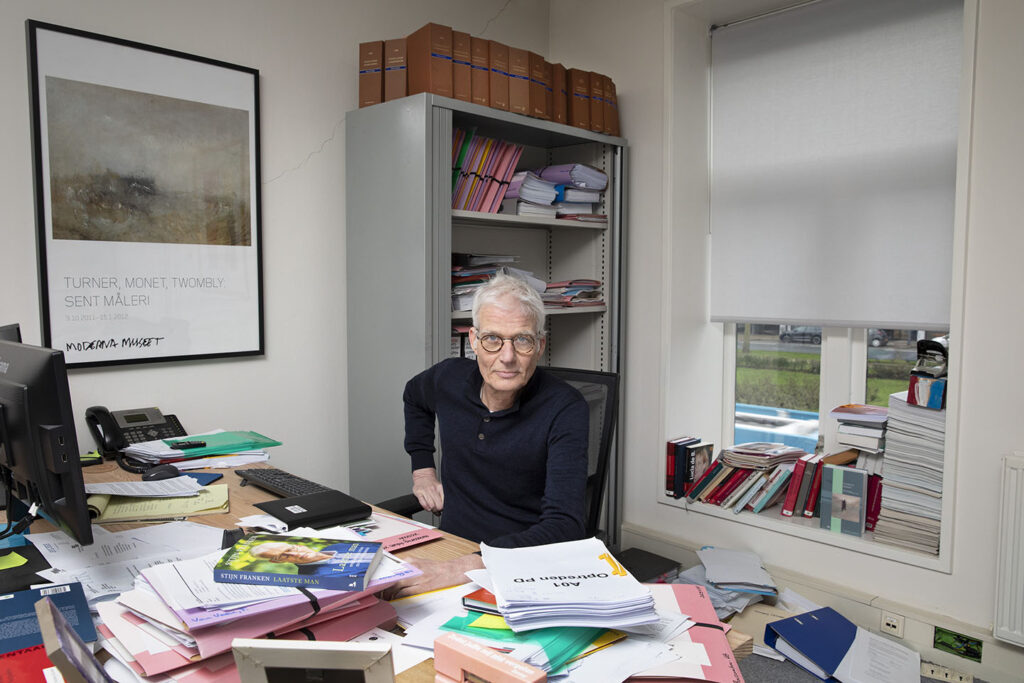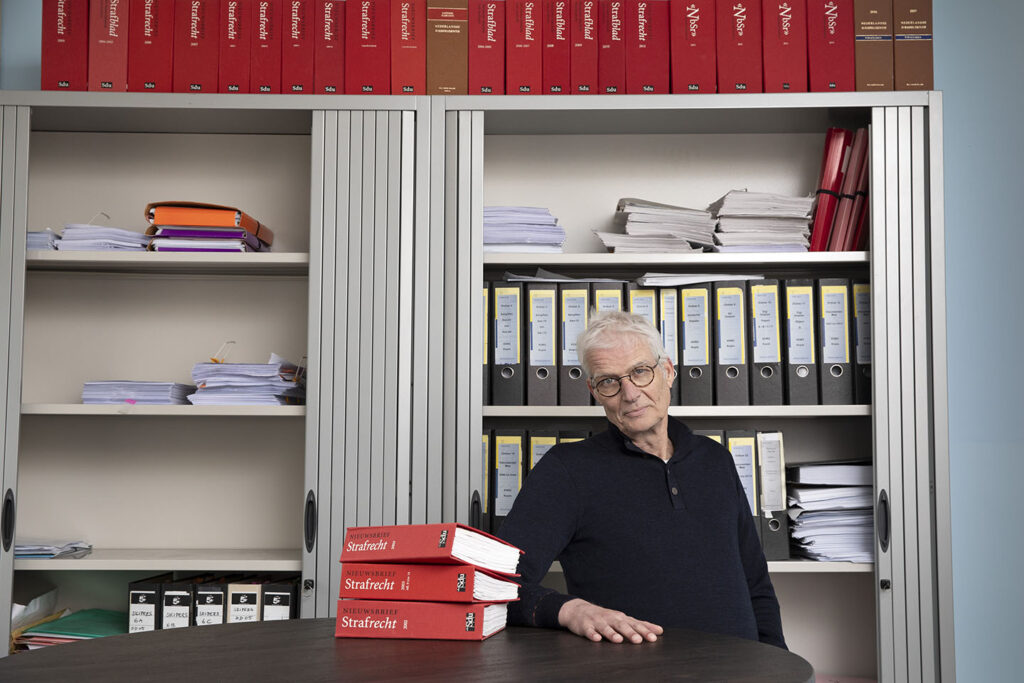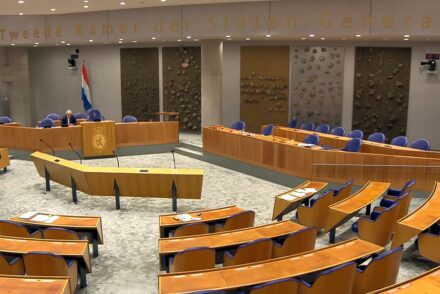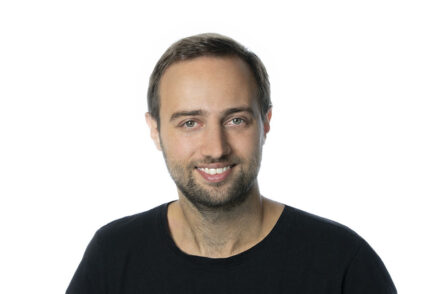Former Holleeder lawyer Stijn Franken: ‘More humility would benefit lawyers’
Willem Holleeder, Lucia de Berk, and Volkert van der Graaf. Criminal defense lawyer Stijn Franken represented them all. In his book Laatste man (“The Last Man”), the terminally ill Franken looks back on his extensive career, which started at Tilburg University. ‘Every student in higher education is a privileged person.’

Criminal defense lawyer Stijn Franken (Breda, 1967) works in an office on an Arnhem floor above a well-known pizza chain. Those who ring the doorbell and climb the stairs to the first floor will still smell pizza for a while. Franken, in jeans, sweater, and white sneakers, arrives a little later, just back from a hospital appointment. ‘Has anyone offered coffee yet?’
Since Franken was diagnosed with a terminal illness and his book Laatste man was published, he has started speaking to the media—something he actively avoided during much of his career. ‘Some lawyers are more famous than their clients. But it’s about the defendant, not the lawyer.’ The book includes substantive and also humorous insights. For example, Franken describes how Willem Holleeder and he greeted each other: ‘Hey, lawyer.’ ‘Hey, criminal.’
It is also Holleeder who calls his former lawyer from the Extra Secure Institution (EBI) in Vught when he learns that Franken is ‘really ill.’ Franken writes about this: ‘Willem Holleeder is a criminal, but also a very loyal man.’
Started here
Professional football players, faction leaders, ministers, presenters, and judges. Tilburg University has many famous alumni. In the column Started here Univers looks back on their student years.
During the interview, Franken prefers to sit in a chair that offers the best view of the door. With a cup of coffee in hand, he talks about his first year as a law student at Tilburg. ‘To my shame, I have to admit that I didn’t study very hard that year.’
In your book, you describe your first year as a year of partying. You even forgot to register for exams.
‘I can only guess why I forgot back then. I probably just didn’t think about it, or I was still in bed. I remember that period feeling like an endless summer. But after that year, I took it more seriously because I really enjoyed it and got hooked on the subject, especially criminal law. I eventually graduated in four years, at just 22 years old.’
If your children asked about your best memory from that time, what would you say?
‘I think my children would find me very boring. By the way, I consider boring to be an underrated trait. There’s nothing wrong with being boring. All these people bungee jumping these days… why would you do that? But that aside. I remember that, as a young student assistant, I was taken seriously at the university. I found that special. I was never a member of a student association, so I was a bit boring.’
There is a lot of ignorance about the job of a criminal defense lawyer, you think. What is the biggest misconception?
‘I think many people have the image of men in suits with fast cars and expensive watches who earn a lot of money and, by definition, try to twist the truth. What it really comes down to in my profession is hard work. We try to assist people who are often going through the most difficult phase of their lives as well as we can.’
‘Also, the idea that if a lawyer frequently appears on television, they must be very good is unfounded.’
Do current law students have a good idea of the world they are entering?
‘I don’t know, but I hope that during their studies, they don’t just learn what the law says and how the law is interpreted by judges. I hope they also learn how to deal with people. If they later hold a position in criminal law, for example as a judge, lawyer, or prosecutor, it is important that they realize they are dealing with real people. And often, these are people who have had a harder time in life than they have.’
What do you mean by that?
‘Every student in higher education is a privileged person. In my field, I come across clients who have brought their troubles upon themselves, but also clients who are less fortunate: people with intellectual disabilities, mental health issues, or addiction problems. I think it’s important that students not only learn the law but also get to know the human side of law: talk to your clients, get to know them a little, and look beyond your own bubble.’

‘People sometimes think they’ve earned their social position entirely by themselves, when, in fact, it’s often a matter of luck. You shouldn’t place yourself in an elevated position and think that you know everything.’ Franken emphasizes: ‘And this really happens, you know? Judges and defendants don’t understand each other because they have different backgrounds and, so to speak, speak different languages.’
‘The people in their forties, fifties, and sixties in criminal law haven’t done so well in this regard. But I have great confidence in the young people entering the judiciary; they can do it better than old people like me.’
What qualities make a good lawyer?
‘A good lawyer is willing to work hard. That’s where it starts. Additionally, a good lawyer has a thorough knowledge of the law and how it is interpreted in the courts. You also need the ability to show empathy for others. A bit of creativity and language skills help too.’
There is currently a lot of debate about unnecessary complicated legal jargon.
‘Try to express yourself carefully and precisely. But more important than language skills, I think, is the way you present yourself as a lawyer. Lawyers are very good at using linguistic subtleties to avoid answering the real question.’
‘I am guilty of this too: talking around an issue until everyone forgets what the original question was. As a judge, lawyer, or legal professional, you learn this too, and it’s not always a good thing.’
You are also a professor at Utrecht University, in addition to being a criminal defense lawyer. After Lucia de Berk, who had previously been sentenced to life in prison, was finally released in 2010, you gave lectures to first-year law students together with her. Why did you do that?
‘Lucia often experienced that, when she was prosecuted, she was hardly seen as a human being. She was viewed as a serial killer, someone who had taken the lives of babies and elderly people. Terrible. For Lucia and me, it was important to not only teach students the basics of criminal law but also to show them that, as a lawyer or judge, you have a big responsibility.’
‘That is the responsibility to treat people in a decent and humane way. Lucia was able to make this very clear to students. We gave these lectures for several years, and the room was always packed.’
You say that a good lawyer must be willing to work hard. In your book, you describe how, over the past 35 years, you were always working. Was it worth it in hindsight, do you think?
‘Yes and no. If you want to be a good lawyer and help people, sometimes you have to work very hard, even when others are free. I’ve worked on Sunday afternoons or in the middle of the night and thought: why am I doing this? But I can’t tell my clients: I’ve worked hard enough this week, so I’m not going to prepare for the case we have tomorrow.’
‘If you really want to be good and truly do what you were meant to do as a lawyer, you sometimes have to work hard. And yes, it’s absolutely worth it. But also knowing that this hard work sometimes comes at the expense of the people you love.’
What would you like to advise today’s law students?
‘Do it better than my generation. Don’t look up to the gray men and women. Always keep in mind what it’s really about: questions of justice, guilt, and punishment, not about “will we meet the deadline” or “are we running late.” I hope students will still remember that in 30 years because once you’re in the rat race, it’s hard to keep that focus.’
You write that you’ve come to realize that lawyers are not such nice people.
‘I think lawyers have a kind of self-satisfaction. A bit more humility and modesty would be good.’
All in all, you conclude in your book that you’ve been a good lawyer. Aren’t you being too modest?
‘No, I think I can say that I was a good lawyer. That’s different from calling yourself a top lawyer. On the whole, I did my job well because every person makes mistakes. And I did my job with a lot of pleasure and with heart and soul. But it’s not like that makes me a special person, because there are many people in our society who work hard, and I just happened to do it as a lawyer.’
CV (brief)
1985-1989 Law studies, Tilburg University
1993 PhD, Tilburg University
1993 Admitted to the bar
2002-present Professor of criminal law at Utrecht University
2002 Represents Volkert van der Graaf
2003 Represents Lucia de Berk
2008 Represents Willem Holleeder
2010 Establishes his own firm, Franken Zuur Van Baarlen Van Kampen
2014 Represents Willem Holleeder again
2018 Voted the best criminal defense lawyer in the Netherlands by colleagues
2023-present Spijker Criminal Defense Lawyers, Arnhem
2024 Publishes De laatste man (The Last Man)







